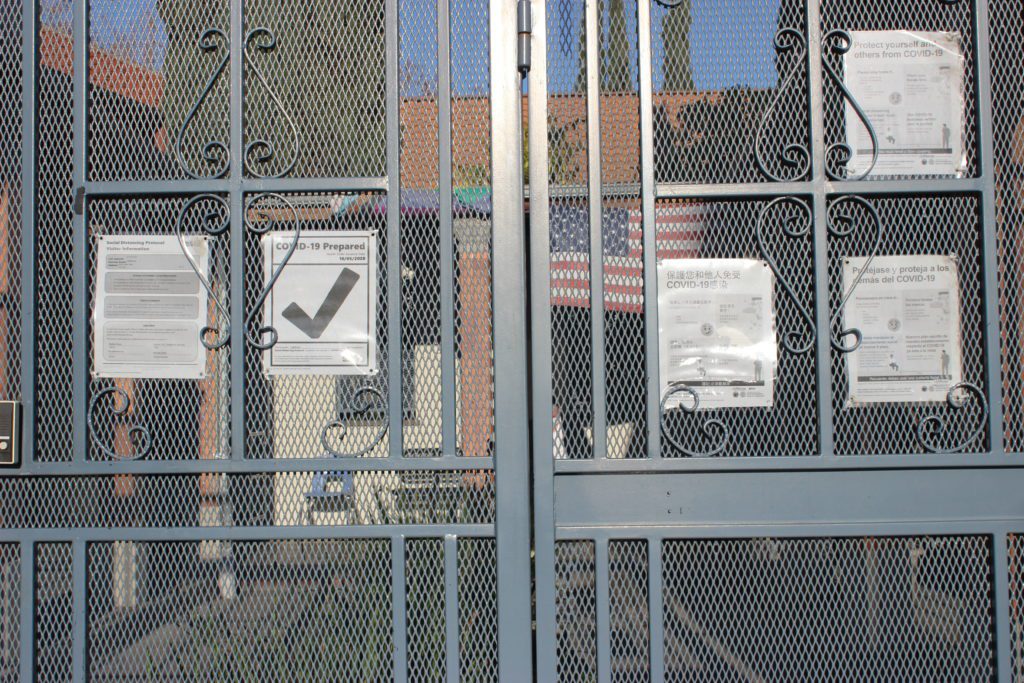A COVID-19 outbreak has made its way to the Julian Street Inn housing site in downtown San Jose.
This week, seven out of the 54 residents who live at the congregate shelter for homeless residents tested positive for COVID-19. This comes as positive infections are climbing in Santa Clara County as the omicron variant spreads.
“That’s almost 15% of people here, which is enough to be worried,” Jimmy, a Julian Street Inn resident and veteran, told San José Spotlight. “But I wouldn’t really blame the staff.”
The site is operated by nonprofit LifeMoves, which runs several homeless shelters throughout the Bay Area.
Jimmy, who preferred to not use his last name, said he believes staff are doing everything they can to curb the spread of the virus. They encourage and remind residents to wear masks and social distance, they test residents weekly and when a person tests positive, they are transferred to a hotel room off-site to quarantine.


Another resident and veteran, Gregory Freeman, echoed the sentiment, noting people individually take a risk of infection when they leave the shelter, especially as many are not vaccinated.
“This place is on top of everything,” Freeman said. “We actually got tested two times in one day after there was a positive case detected, so they really do a good job.”
The limiting factor among the unhoused community: vaccine hesitancy is rampant.
Shaunn Cartwright, founder of the Unhoused Response Group and longtime homeless advocate, said the unhoused community is likely one of the most unvaccinated groups in the region because of mistrust in government and misinformation.
“There is a natural distrust of authority, meaning police, city, county because these are your natural adversaries. They’re kind of always causing you harm,” Cartwright told San José Spotlight. “They’re sweeping you; they’re arresting you; they’re harassing you. So, you can’t really believe that they’re going to tell you the truth and they’re out there to help you.”
Aubrey Merriman, CEO of LifeMoves, said structural and institutional factors have “greatly contributed” to those experiencing homelessness, so having a mistrust in those institutions is understandable.
But he does not fault those who are hesitant and instead tries to meet them halfway.
“It’s important in the best of our ability that we suspend judgement and really just sort of understand that each client has their own personal narrative and story, and there’s a context surrounding them,” Merriman told San José Spotlight. “So, part of our strategy is to incentivize our clients.”
At the Julian Street Inn, staff have brought in speakers to discuss vaccine efficacy and offered $45 gift cards to encourage individuals to get booster shots.
Merriman said while his team has considered mandating vaccines for clients like they do employees, he doesn’t want to impose additional barriers for unhoused residents seeking support—especially when they have to navigate so many barriers already. He said while vaccine hesitancy exists in the unhoused community, it’s not unique and specific to them, so it’s not fair to scapegoat the homeless as a reason for the rise in infections countywide.
“It’s not like the folks that are experiencing homelessness are in Nordstrom and Valley Fair mall,” Merriman said. “They are in a lot of ways segregated and this omicron uptick is ceremonially undiscriminating.”
Merriman and Cartwright said other congregate shelters and encampments have also experienced a rise in positive infections.
The Sunnyvale Family Shelter, owned by Santa Clara County and run by nonprofit HomeFirst, saw five cases of COVID in November, officials told this news organization last month. Jerome Shaw, a longtime shelter resident and San José Spotlight columnist, said on-site staff have consistently failed to enforce mask mandates at the shelter for months, putting everyone at risk.
Advocates say most COVID cases in South Bay homeless shelters are not serious.
Of the roughly 250 homeless people who died on the streets of Santa Clara County in 2021, only 10 are attributed to COVID-19, according to data collected by Cartwright.
Contact Jana Kadah at [email protected] or @Jana_Kadah on Twitter.



Leave a Reply
You must be logged in to post a comment.